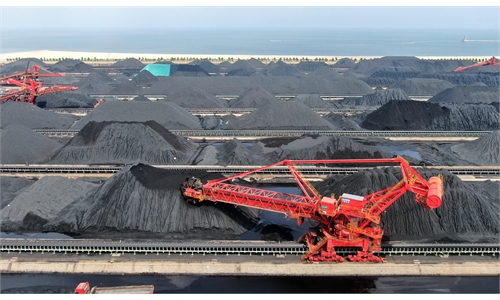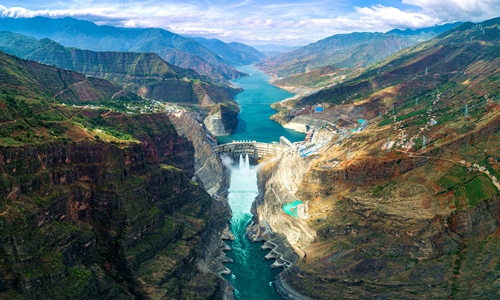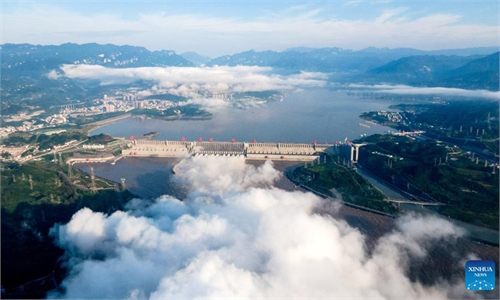GT Yearender: How China ensures energy security at home, helps tackle the global energy crisis abroad
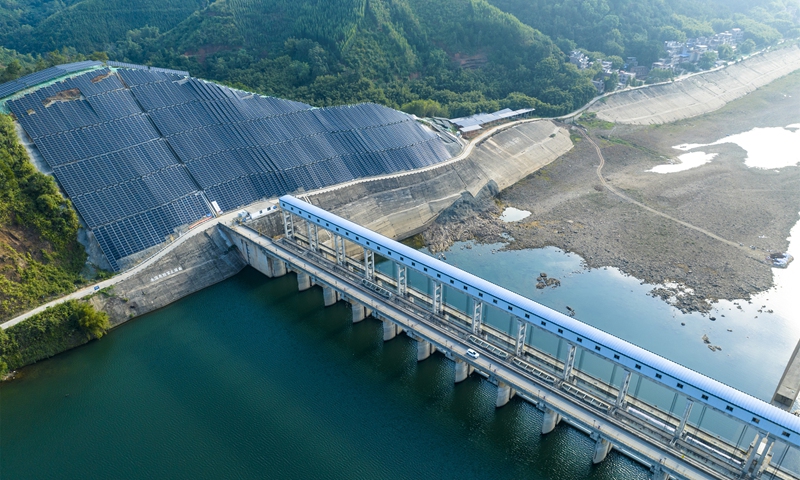
Photo taken on December 9, 2022 shows the photovoltaic power station and hydropower station in Wuzhou, South China's Guangxi Zhuang Autonomous region. Photo: VCG
In early October, as the 2022 World Team Table Tennis Championships held in Chengdu, Southwest China's Sichuan Province came to conclusion, with the Chinese team overcoming Germany in the men's final, an unusual piece of news unrelated to ping-pong, as table tennis is also known, made headlines and trended across various Chinese social media platforms. "As foreign players are leaving, the people of Chengdu brought out electric blankets," reads one headline.
According to a local news outlet, the local organizing committee of the event put together a shopping festival for players to "bring home Chengdu [products]," and locally produced electric blankets were particularly popular among European players. Chinese netizens were delighted by the news. "This arrangement is so considerate," one commented. "This must be a real necessity for European athletes," another teased.
The story, though rather lighthearted, highlighted the fallout of an acute global energy crises in 2022 due to a complex set of factors, including the Russia-Ukraine conflict and US-led Western sanctions against Russia, a main energy exporter to Europe. It also showed the increasing number of ways with which China is helping the world tackle the global energy crisis. Over the past year, Chinese-made heating equipment including electric blankets helped keep many people around the world, including the US, warm as they faced skyrocketing energy bills. The vast Chinese market also became a safe haven for foreign companies, particularly those in EU, as they faced energy and other challenges in their home markets.
Still, the most direct contribution China made to helping tackle the global energy crisis was the country's achievements in ensuring energy security at home despite multiple challenges from the disrupted global market to the extreme weather at home. Over the past year, China not only protected its domestic energy supply and maintained relatively stable prices, the country also made stride in its transition to clean energy. Such feats in China, one of the world's biggest energy consumers, greatly help ease global energy crisis and address climate change, analysts noted.
Domestic energy security
Amid the global energy crisis, China ramped up its efforts to ensure domestic energy security by enlarging output of traditional energy, promoting opening-up and boosting clean energy transformation.
Despite soaring international energy prices in 2022, prices remained relatively stable in China. Some regions across the country such as Southwest China's Sichuan and Chongqing managed temporary power shortages during the summer months, as record-high temperatures and sparse rainfall led to a drop of water levels at key hydroelectric plants. As a result, the country stepped up its efforts to increase coal production. Between January and November in 2022, China's coal output grew 9.7 percent year-on-year to reach 4.09 billion tons, hitting a new record high, according to data released by the National Energy Administration (NEA) on December 16.
China has also enhanced its renewable energy investment this year, with the construction of large-scale wind power facilities and photovoltaic bases accelerated, especially in desert areas. The country's total installed power generation capacity of renewable energy reached to about 2.5 billion kilowatts, rising 8.3 percent year-on-year, NEA data showed.
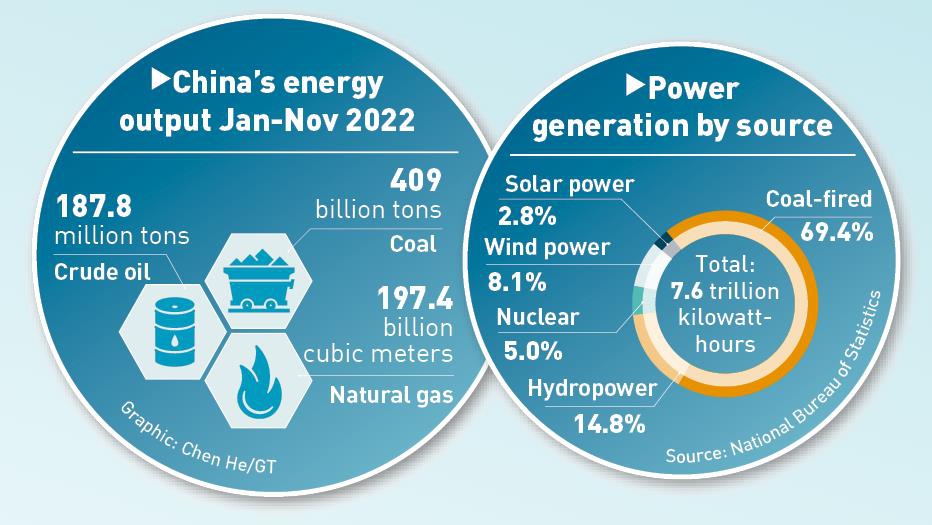
China's energy output Jan-Nov 2022 Graphic: GT
"China's reliance on imported oil and gas now exceeds 50 percent, and thus a lesson from the energy crunch in Europe is diversifying energy supply. At the moment of transition from traditional fossil fuel to clean energy, we should also step up the clean utilization of fossil fuels like coal and petroleum while developing new energy," Jin Lei, a professor with China University of Petroleum, told the Global Times on Tuesday.
In addition, at the China-Gulf Cooperation Council (GCC) summit held in December in Riyadh, Saudi Arabia, the Chinese side called on China and GCC states to build a multidimensional energy cooperation paradigm, strengthening cooperation in oil and gas development as well as in clean and low-carbon energy technologies.
As an important part of the integrated cooperation between China and Qatar, China Petroleum & Chemical Corp and QatarEnergy signed a 27-year liquefied natural gas (LNG) purchase and sales agreement in November, which will see the annual supply of 4 million tons of LNG to Sinopec.
"Apart from cooperation with traditional energy exporters, there is great potential for cooperation between China and Western countries in terms of new energy, especially solar power, given the technological and economic feasibility," said Jin, who also urged Western countries to stop political intervention in future climate cooperation.
Supplying warmth to world
In stark contrast to China's relatively stable domestic energy supplies and prices, the severe economic impacts of the energy crunch are being felt in many parts and aspects in Europe.
According to media reports, electricity price in Germany surged up to 0.7 euro per kilowatt-hour (kWh) in August, while that in France spiked to 1.1 euro per kWh, up about threefolds that was seen during the same period in 2021 and about 10 times the price of civil use electricity in China.
As a result, European consumers were reportedly forced to turn off lights, lower thermostats as well as central heating to reduce energy use. At the critical moment, Europeans relied on made-in-China electric heaters, electric blankets, warm leggings and other products for the cold winter.
A manager with an electricity equipment producer based in Cixi, East China's Zhejiang Province told the Global Times on Tuesday that this year, European customers have had strong demand for heating equipment such as electric heaters and electric blankets.
He estimated that the annual export this year will exceed 200 million yuan, including the newly added order of 20 million yuan. "Chinese products have advantages in terms of cost performance, production capacity, and a strong safety record, and are favored by European consumers," the manager said on condition of anonymity.
The demand for heating equipment surged the most from June to October this year. The orders increased by more than 50 percent compared with the same period last year, and the exports to Europe increased by 40 percent, the insider said.
In addition to Europe, China's exports of electric blankets to other countries and regions, such as the US, also rose sharply. In the first 10 months of 2022, total export of electric blankets exceeded 24 million, of which 12.705 million were exported to the US, accounting for 52 percent of the total export, and 5.358 million were exported to major European countries (28 countries in the EU + UK), accounting for 22 percent of total exports, according to official customs data.
In early November, there was also a spike in additional orders. After that, all orders that should be placed in winter have been placed, and the goods have almost been delivered, the manager said.
Amid surging demand for alternative energy sources against the backdrop of global energy crunch and major developed economies' carbon agenda, China's exports of new-energy products also showed remarkable growth so far this year.
According to data from the General Administration of Customs, China's exports of machinery products reached 12.47 trillion yuan in the first 11 months of 2022, up 8.4 percent year-on-year. Over the period, the country's exports of electric vehicles, lithium batteries and solar cells grew by 128, 86.6 and 74.3 percent year-on-year.
In addition to supplying heating equipment, the Chinese market also became a safe haven for companies from Europe and other regions that were facing energy and various others challenges at home. German chemical giant BASF launched its Verbund site in the city of Zhanjiang, South China's Guangdong Province.
The 10-billion-euro complex will be the third-largest BASF site in the world, and the largest single investment project by a German enterprise in China, reflecting the German industrial icon's bet on booming Chinese markets while cutting reliance on Europe amid skyrocketing energy costs in the continent.
In about a month after its high-profile expansion in China, BASF said that costs at sites in its European home market need to be brought to a "permanently" lower level because of a triple burden of sluggish growth, high energy costs and over-regulation, Reuters reported.
"Because of the explosion in energy prices in Europe as a result of many factors, among them the sanction policy against Russia, the sabotage of the Nordstream pipelines, and not thought through decisions in the energy policy before, such as the German exit from nuclear energy, many countries in Europe are no longer tenable as industrial sites," Helga Zepp-LaRouche, founder and president of the Germany-based think tank Schiller Institute, told the Global Times.
"EU investment into China is below its potential," the European Union Chamber of Commerce in China told the Global Times on Friday, noting that over the past 20 years, EU businesses invested a total stock of 155-160 billion euros into China, the same amount that they invest in the US every six months.
